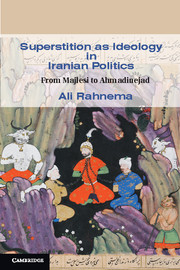Book contents
- Frontmatter
- Contents
- Preface and Acknowledgements
- Introduction
- Part I POLITICIZING OCCULT ISLAM
- Part II POPULAR SHIʿISM
- 4 Milieu, Childhood, Sanctity and Fame
- 5 From Conceptualization to Officialization of a Religio-political Ideology
- 6 Deficiency and Defectiveness of the Human Mind
- 7 Society Needs the Leadership of Jurists and/or Kings
- 8 Superstitious Education
- 9 Reconfigurating the Necessities of Belief
- 10 Majlesism as an Ideology
- Conclusion
- Bibliography
- Index
- List of Books in the Series
5 - From Conceptualization to Officialization of a Religio-political Ideology
Published online by Cambridge University Press: 05 June 2012
- Frontmatter
- Contents
- Preface and Acknowledgements
- Introduction
- Part I POLITICIZING OCCULT ISLAM
- Part II POPULAR SHIʿISM
- 4 Milieu, Childhood, Sanctity and Fame
- 5 From Conceptualization to Officialization of a Religio-political Ideology
- 6 Deficiency and Defectiveness of the Human Mind
- 7 Society Needs the Leadership of Jurists and/or Kings
- 8 Superstitious Education
- 9 Reconfigurating the Necessities of Belief
- 10 Majlesism as an Ideology
- Conclusion
- Bibliography
- Index
- List of Books in the Series
Summary
THE RELIGIO-POLITICAL SIGNIFICANCE OF BAHAR AL-ANVAR: THE PANDORA'S BOX
To contextualize the significance of Majlesi's compilation of Bahar al-Anvar, it is necessary to grasp the significance of the transition from the early and abandoned texts to the later standard report compilations. Majlesi attached greater importance and merit to those long-abandoned reports, which he included in his compilation, than the reports found in the standard Shiʿi hadith compilations of Koleyni, Ebn Babawayh and Tusi. In his important contribution to the study of early Shiʿism, Amir-Moezzi refers to a process of moving from “traditionalism” to “rationalism” starting in the fourth/tenth century. He explains that, in this process, pioneered by Sheykh Mofid (d. 413/1022) and Sharif Morteza (d. 436/1025), there is “a progressive silencing of a number of traditions”. The traditions or reports silenced are those “with a quite original metaphysical and mystical (and thus ‘heterodox’) scope in Islam”.
Based on three themes in Imamate dogma – “(1) cosmogenic data; (2) information on the miraculous and occult aspects of the imams, particularly where these concern knowledge and their supernatural powers; and (3) those data pertaining to what the imams thought of the Qur'an” – Amir-Moezzi argues that from Saffar Qomi's (d. 290/903) oldest compilation of Imamite dogma to Koleyni (d. 329/940), Ebn Babawayh (d. 381/991) and finally to Mofid and Morteza, there is a process of culling, diluting and silencing the supernatural and occult reports. Amir-Moezi identifies a movement from non-rational and esoteric traditions to the rational ones.
- Type
- Chapter
- Information
- Superstition as Ideology in Iranian PoliticsFrom Majlesi to Ahmadinejad, pp. 184 - 199Publisher: Cambridge University PressPrint publication year: 2011



